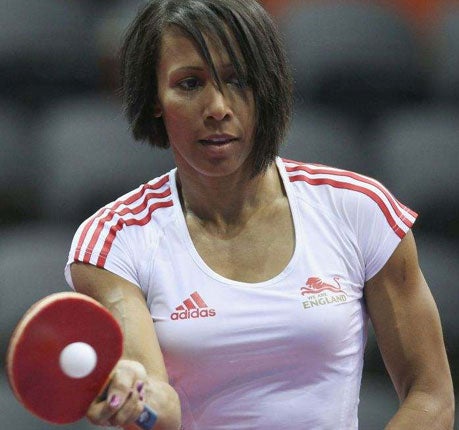Holmes: We nearly pulled out to ensure our athletes' safety
Athletes who stayed at home will regret it, says Team England's president, who is happy with 37 golds

As Dame Kelly Holmes spoke at the Team England Lodge yesterday, the battle for second place in the Commonwealth Games medals table still hung in the balance. On the English honours board at one side of the room were 37 gold medal stickers. On the television screen opposite was Saina Nehwal, scrapping for gold medal No 38 for India in the badminton women's singles final.
Australia were already home and hosed in the gold medal stakes, with a Fort Knox collection of 74. And England had no more golden shots, their three badminton finalists on the final day of competition at the XIX Commonwealth Games (Nathan Robertson and Jenny Wallwork in the mixed doubles, Rajiv Ouseph in the men's singles, and Robertson and Anthony Clark in the men's doubles) all having come to grief against Malaysian opposition at the Siri Fort Sports Complex. If they were to hang on to second for a fourth successive Games, by virtue of a superior overall medal tally (142 to 101), England would need the Malaysian in the women's singles final to see off Nehwal.
It was not to be. The Indian fought back from match point down to win 19-21, 23-21, 21-13. From their shambles of a Games, the host nation had salvaged the pride of their best ever showing on the medals front.
More importantly, perhaps, through all of the mishaps and mismanagement – the unfinished athletes' village, the fallen footbridge, the dodgy boxing scales, the Delhi belly outbreak that threatened to sink the swimming squadrons, the crowds kept away from the cycling road races – the 2010 Games somehow managed to muddle through to the conclusion of yesterday's spectacular closing ceremony. That itself was the biggest triumph, because these were the Games that very nearly weren't.
The Scots were so outraged by the state of the village 10 days before the scheduled start they had letters drafted ready to announce their withdrawal. As Dame Kelly, the president of Commonwealth Games England, confirmed, the English were also on the brink of a boycott. "It was close," she said. "We put a lot of pressure on the Indian authorities and the Games Federation to ensure the paramount issues of the safety of our athletes and a secure environment.
"It was only in the last week before coming over that it all turned around. Once Sheila Dikshit [the Chief Minister of Delhi] came in, apparently she did kick shit. That gave us confidence and I think that the other nations followed us when we made the decision to come. We made the decision because of the athletes. A lot of them pulled out, making rash decisions because of the information that was out there, instead of having trust that we as a nation would be thinking of their interests first.
"Now that they see this," the double Olympic gold medallist added, gesturing to a room full of English gold medal winners, "there will be a lot of athletes who will regret not coming."
Despite those who didn't come – Phillips Idowu, Jessica Ennis, Mo Farah, Beth Tweddle, Victoria Pendleton, Bradley Wiggins and others – Team England still managed to claim more golds (well, one) and more medals in total (an extra 32) than they did with a supposedly stronger squad at the 2006 Melbourne Commonwealth Games.
"The athletes have done a stellar job in putting us where we are," Craig Hunter, England's chef de mission, said. "We thought that India, with a home Games advantage, would be significantly ahead of us. We're proud that we got to the wire with them."
Holmes added: "I'm really glad that we've done so well, because everyone was talking about the superstars not coming. But the Commonwealth Games makes stars and we've done just as well without them. Had they been here, some of our newer athletes wouldn't have got medals, so actually I don't think it's made a blind bit of difference whether they came or not. It's given the platform for others to believe in themselves."
From a Scotland team shorn of Sir Chris Hoy, there was a more than satisfactory haul of 26 medals: nine gold, 10 silver, seven bronze. They finished 10th in the order of merit. "I'm delighted with what we have achieved," Jon Doig, Scotland's chef de mission, said. "Only in Melbourne in 2006 have we won more golds. We slightly exceeded our target of 18 to 25 medals." Which can only bode well for the home Games of 2014 in Glasgow.
Northern Ireland finished 13th in the table with three golds (all from the boxing finals on Tuesday night) and 10 medals in all. Wales were 15th.
Join our commenting forum
Join thought-provoking conversations, follow other Independent readers and see their replies
Comments
Bookmark popover
Removed from bookmarks